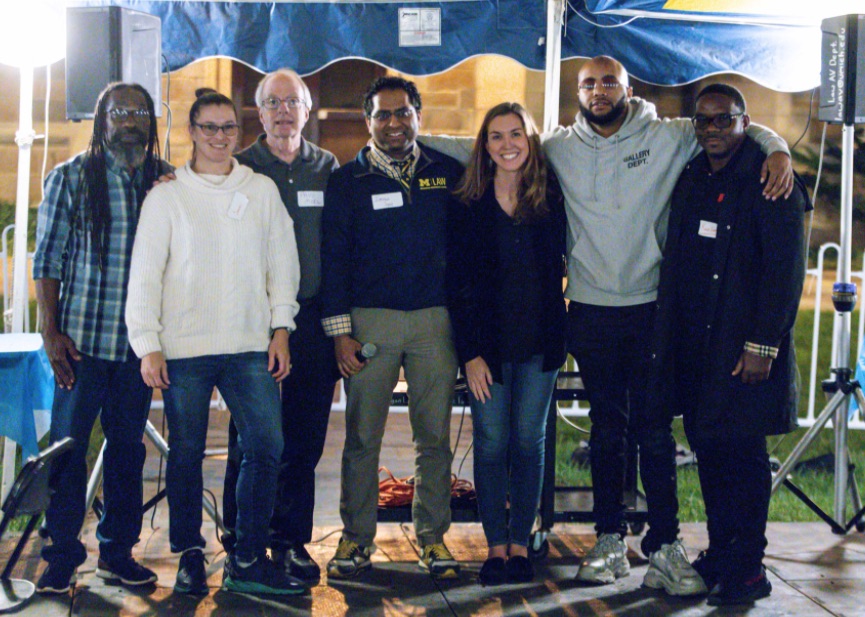Even as she went to trial in 2003, Tonia Miller says, she expected to be found innocent. She knew she hadn’t abused her baby, she explains, and, “I trusted the justice system.” Her chuckle at her own youthful naïveté is more wry than bitter.

Unfortunately for Tonia, the medical experts at the time were adamant and unanimous. Even though 11-week-old Alicia showed no bruises, grip marks, or fractures, even though the baby had been sick her entire life, with chronic collections of subdural blood possibly dating from birth, and even though no one had ever seen Tonia mistreat either her baby or her toddler, doctors testified at trial that the pattern of bleeding and swelling inside Alicia’s head could mean only one thing: Shaken Baby Syndrome (SBS). The young mother was found guilty of second-degree murder.
But those experts were wrong.
Tonia’s conviction was vacated in 2020, after four new experts brought in by the Michigan Innocence Clinic re-examined the medical records and concluded, unanimously, that Alicia had died from pneumonia.

“There was nothing subtle here,” emphasizes clinical law professor David Moran, co-founder of the Michigan Innocence Clinic and the driving force behind the appeal. “The pneumonia was blindingly obvious. But the presence of the triad closed down critical thinking. No one ever questioned the initial diagnosis.” Moran calls the case “an especially stark example” of shaking theory in the courtroom.
Incredibly, the autopsy report had noted pneumonia in the child’s lungs, and she’d been recovering from a respiratory infection, a well-recognized precursor to pneumonia in newborns. In the weeks before Alicia’s collapse, Tonia had sought medical help for her daughter repeatedly, with reports of weak sucking, breathing problems, and even seizures, witnessed not only by Tonia but also by relatives and neighbors.
Moran’s appeal also argued that the triad of findings—retinal hemorrhage, subdural hematoma, and cerebral edema—underpinning Tonia’s conviction is no longer considered proof of shaking. The appeal judge concluded that SBS has become “controversial” and noted “a shift in the scientific consensus.”
Dr. Steven Gabaeff, a clinical forensic medical specialist and an emergency physician for 40 years, says he finds the shift-in-consensus element ironic, because there has never been any scientific proof that the triad results only from shaking, despite the testimony at Tonia’s trial. “It was false evidence. It was never true,” he points out, “And this case proves that yet again.”
The pneumonia had compromised Alicia’s lungs, reducing the amount of oxygen available to her brain. Breathing, controlled at the brain stem, is one of the first functions to be affected when the brain is in trouble. Weak breathing can compound the oxygen problem just by itself, and on the morning Alicia was rushed to the hospital, her airways were obstructed by the formula she had apparently choked on. As detailed in the new reports, a series of natural processes readily explains how pneumonia in the lungs can lead to bleeding and swelling in the brain.
Even after her conviction was vacated, Tonia remained in prison while the state appealed the decision. She was finally released on bond in April of 2021, with the spectre of a second trial hanging over her. This fall, the state dropped all charges, and now she is free to plan her life.
Tonia seems to hold few grudges. She says she doesn’t take it personally that the relative who eventually adopted her older daughter cut off all contact—although she still hopes to reconnect with her surviving child, now a young woman. And she understands why Alicia’s father quit writing when he married: “I have to put myself in his wife’s shoes,” she says. “I wouldn’t want my husband in touch with a woman convicted of murdering a baby.”

Tonia even offers a positive angle on her time in prison, which she says gave her the chance to reflect and to process. Her early life was difficult, she says, and “prison helped me deal with those issues from my past.”
Not that the path was easy.
The early interrogations left her numb and confused, she remembers. “The detectives isolated me from everybody… I tried to tell them what happened, but they kept interrupting, saying I was lying… After a while I started thinking, ‘If I tell you what you want to hear, will you just leave me alone?'”
Tonia had said from the first that she had shaken Alicia gently to revive her, after the girl seemed to gasp and quit breathing—but her accusers insisted she had shaken Alicia violently, just before the breathing problems.
As she explains in the essay that accompanies this post, Tonia was “petrified” on her way into prison. Since then, she has risen to the occasion and more. Now that she’s out, she has found a job she likes and is looking forward to finishing her BA—she earned most of the credits she needs while in prison.
Please see Tonia’s reflections on her experience of prison and exoneration, written immediately after her release.

This photo: After escorting her from prison in April of 2021, Tonia’s legal team took her for her first French toast in 18 years.
See also Tonia’s entry in The National Registry of Exonerations.

October, 2021: At the Michigan Innocence Clinic celebration of four wrongly convicted prisoners released this year.
© 2021 Sue Luttner
If you are not familiar with the debate surrounding Shaken Baby Syndrome, please see the home page of this blog.
